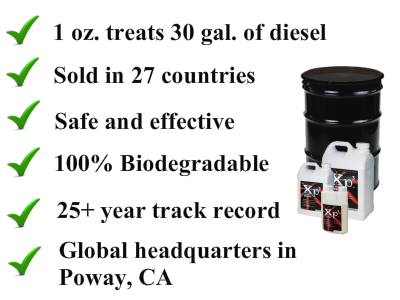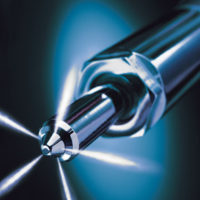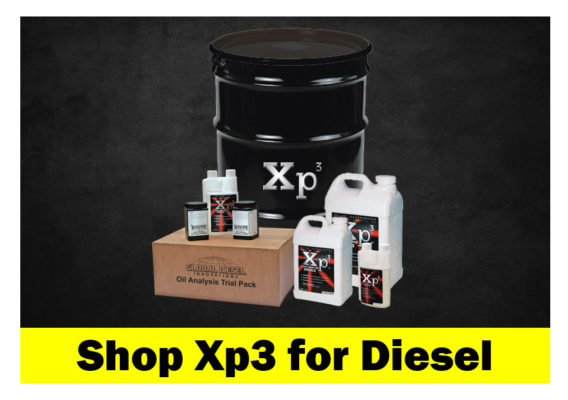Xp3 Diesel Fuel Enhancer

Select the Fuel Problem You Are Looking to Solve!
(Click one of the buttons below or scroll down to learn more about Xp3)
Using Xp3 Reduces Maintenance
Costs and Down Time!
Because maintenance costs and down time reduce profits, many companies are looking for ways to save money.
Fuel is the lifeline that powers your equipment, which also impacts how your equipment performs and how long it lasts. Due to the technology involved in today’s emissions equipment and engines, they are likely to have issues with COMMON DIESEL PROBLEMS INCLUDING::
> Reduced lubricity
> Water contamination
> Incomplete combustion
> Deposits and corrosion
> Premature failure
Using Xp3 increases lubricity, decreases wear metals in your oil, extends engine oil life, and keeps your equipment running better and longer while increasing your company’s profits.
Be sure to check out our independent lab testing.

Independent Lab Testing:
Independent Lab HFRR Report Summary
In this HFRR test performed by FOI Labs, diesel #2 was tested for a “base” lubricity score and showed a wear scar diameter of 360 microns prior to being treated with Xp3.
Then Xp3 Diesel fuel additive was added to the fuel at a treatment ratio of 1 ounce to 30 gallons of fuel (1:4000) which resulted in a wear scar diameter of 300 microns.
As demonstrated in this independent lab test, Xp3 decreased the wear scar diameter and has proven to improve lubricity.
Xp3 Used Oil Analysis Case Study
The purpose of this case study was to prove the lubricity improvements and maintenance savings associated with using Xp3. Prior to using Xp3, the customer sent a used oil sample to BlackStone Laboratories in Ft. Wayne, Indiana; which served as a “baseline”.
When you download the summary PDF, you will see that the customer sent in four more used oil samples taken from consecutive oil cycles using Xp3 in each tank of fuel. These samples were taken at the end of the oil cycle and at the mileage established in the baseline sample.
Notice how Xp3 substantially improved lubricity and extends engine life, which is proven through the decrease in wear metal. Also, note that the oil analysis proves that the customer was able to extend the oil change cycle significantly by using Xp3, which reduces maintenance costs.
Using Xp3 Protects Injectors
and Extends Engine Life!
Injectors, pistons, cylinders, vital engine components and engine oil are directly impacted by poor quality fuel, bio-fuel blends, and fuel contaminants such as water.
Because today’s engines function under extremely high pressures and tight tolerances that require top quality fuel to ensure optimal operation. Over time, injectors and other vital engine components experience PROBLEMS CAUSED BY DIESEL FUEL including:
> Poor performance
> Rust and corrosion
> Injector deposits
> Gums and varnishes
> Premature failure
Xp3 protects and cleans injectors, increases lubricity, improves combustion, and extends life engines.
Be sure to check out our demonstration video and case study.

Demo Video and Case Study:
Xp3 Diesel Pepsi Case Study Summary
Through used oil analysis, Pepsi estimated that they could extend the engine life of their equipment by up to 25%. Xp3 demonstrated that it improves combustion, reduces wear metals and contaminants in the oil, and cleans and protects injectors.
By using Xp3, Pepsi experienced significant savings in MPG and maintenance costs, which positively impacts the profitability of any company!
Using Xp3 Reduces Emissions
and Emissions Equipment Issues!
Many companies are looking for ways to reduce their carbon footprint, but are now also facing issues and expenses related to Tier 4 emissions standards.
In an effort to meet these standards, engine manufacturers are implementing diesel exhaust fluid (DEF), exhaust gas recirculation (EGR), diesel particulate filters (DPF), and selective catalytic reduction (SCR) systems.
While these systems are effective in reducing greenhouse gases such as carbon dioxide (C02), nitrogen oxide (NOx), and particulates, they also create additional purchase and maintenance expenses including:
> DEF consumption costs
> DPF cleaning/replacements
> EGR valve replacements
> SCR system replacements
In order to keep these systems and equipment running well, they depend on quality fuel and improved combustion to help reduce the impact on these expensive systems.
Xp3 improves combustion, reduces emissions and soot, cuts DEF consumption, decreases DPF regenerations, and extends the operating life of your emissions equipment.
Be sure to check out our demonstration video and case study.

Emissions Case Study and Testimony:
Click the picture above this section of text to download a PDF of a used oil analysis performed by BlackStone Labs. The report shows a before-and-after soot analysis from a 2014 International with a Cummins ISX 15.
In page 1 of the report, you’ll find the original used oil and soot analysis which was taken prior to using Xp3 for a baseline of the soot levels for this truck. You’ll notice that before using Xp3, the soot level was documented as “fairly high” at 0.7%.
After using Xp3 in every tank of fuel for during the next oil change cycle, the soot level was reduced by 42.8%. Less soot is evidence of better combustion, which has a positive impact on extending the life of expensive emissions systems like EGR/SCR/DPF. In many cases, owners of equipment with Tier 4 emissions systems that use DEF experience a reduction in the amount of DEF consumed.
Extending the life of emissions equipment and reducing DEF consumption helps to reduce maintenance and operating costs!
Using Xp3 Stabilizes Fuel
and Helps with Degradation!
When compared with traditional high sulfur fuel, ultra-low sulfur diesel and biofuels are less stable, which can lead to significantly decreased shelf-life for fuel. As diesel fuel ages, it oxidizes, breaks down, and agglomerates (clumps together); which leads to problems in the fuel system and engine.
In a study by the University of Idaho, fuel samples were tested to show the percentage of degradation as diesel #2 is stored. This study showed up to 26% degradation of the fuel in just 28 days. The impact of fuel oxidation and degradation is substantial and leads to costly issues such as:
> Gums that lead to injector deposits
> Sediments that clog filters and injectors
> Acids that corrode tanks and fuel systems
> Thickening that leads to incomplete combustion
Fuel instability can also be increased by variables such higher temperatures (via the operating environment or through fuel return lines) and free water in the fuel which leads to issues with microbial growth.
Xp3 slows fuel oxidation, stabilizes fuel during storage, disperses water to reduce the effects of condensation, is an effective biocide, and helps to protect fuel storage tanks from corrosion.
Be sure to check out the additional information on fuel degradation.

More Info on Fuel Degradation:
Independent Lab Bacteria Test Summary
Using the ATSM D7687/E2694 standard, FOI Labs provided a sample of diesel #2 that was contaminated with microbial growth. FOI Labs then treated the contaminated fuel with Xp3 Diesel to determine its effectiveness as a biocide.
The contaminated fuel was treated with Xp3 at a ratio of 1 ounce to 30 gallons of fuel (1:4000). As demonstrated in this independent lab test, Xp3 is an effective biocide and the contaminated fuel treated with Xp3 showed undetectable microbial growth.











